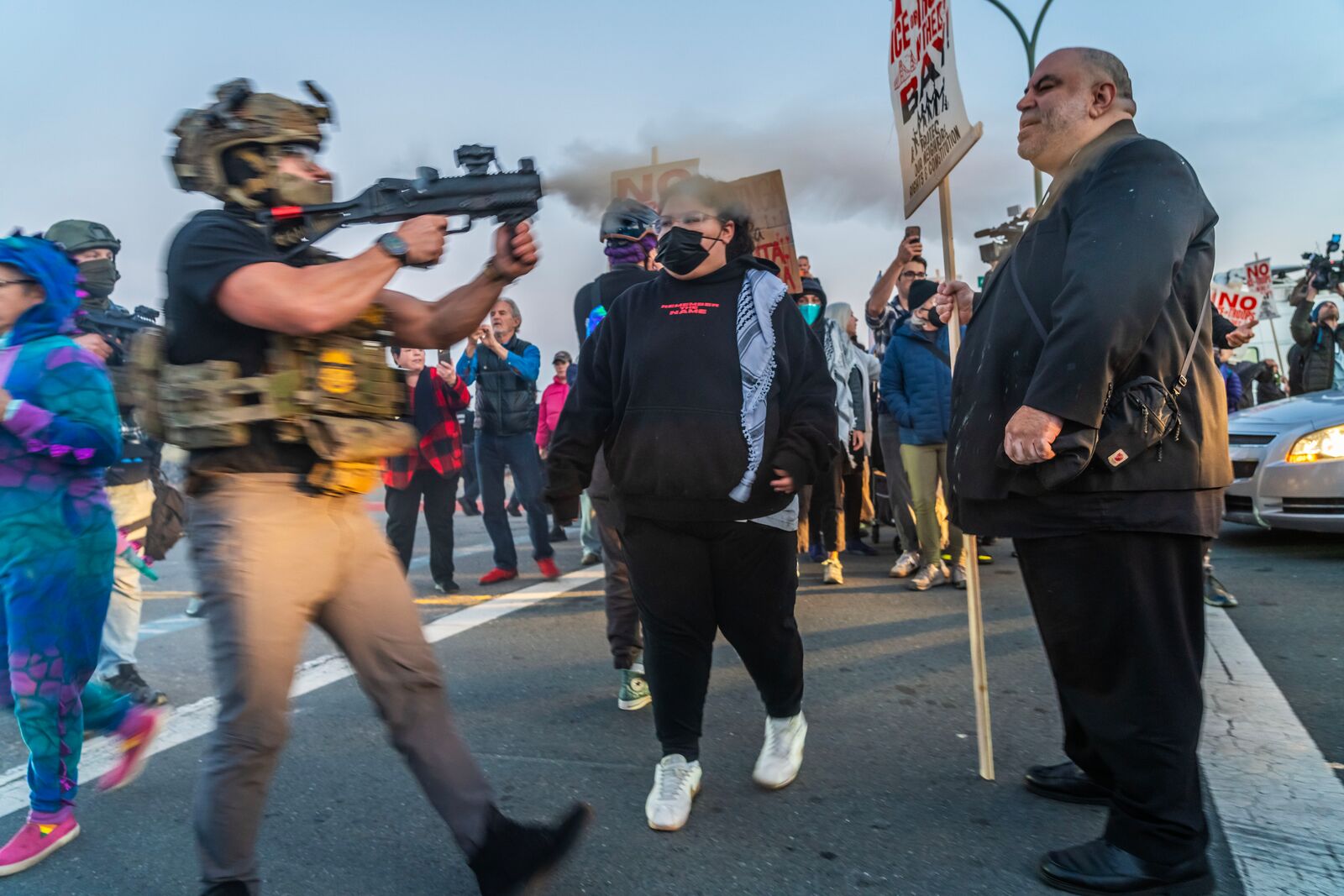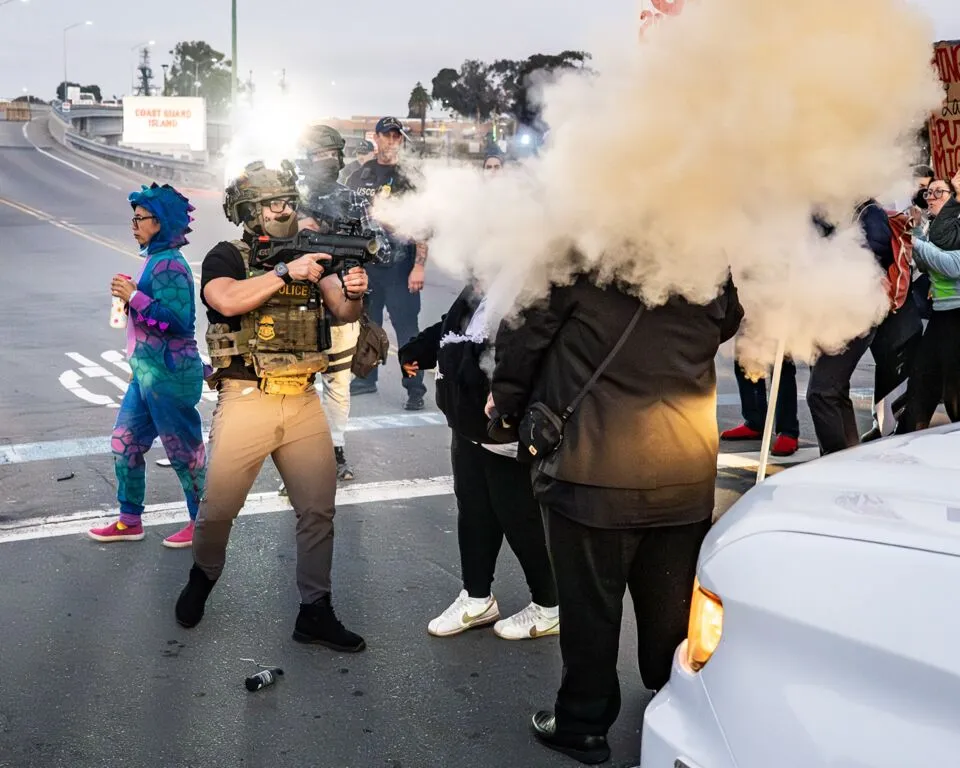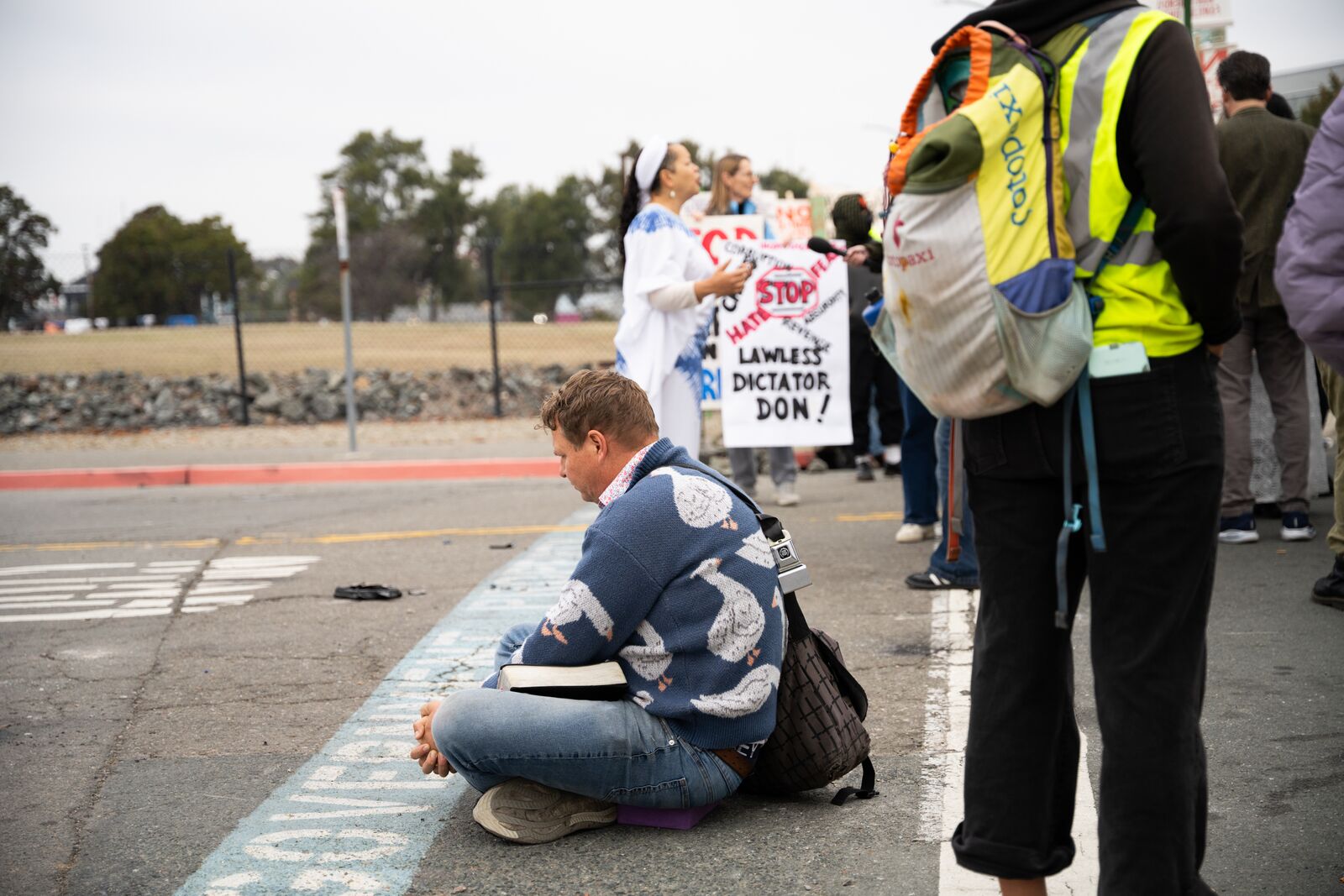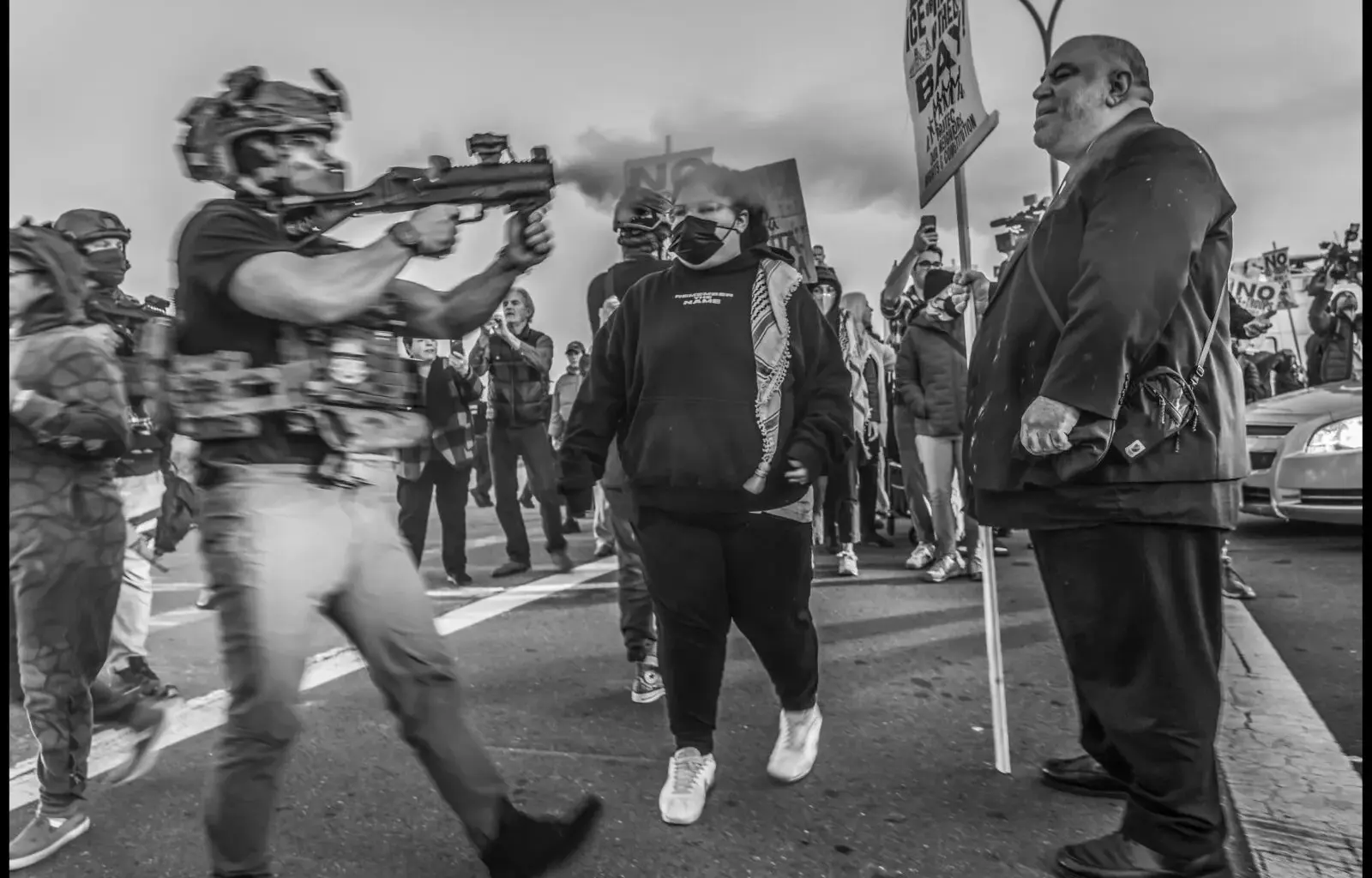Rev. Jorge Bautista arrived in Oakland early in the morning of Oct. 23 with other clergy to protest the Trump administration’s planned law enforcement “surge” in the Bay Area. He stood in the road with dozens of others as part of a Sanctuary Faith Vigil as approximately 10 trucks carrying Customs and Border Protection agents sped to the entrance of the lone bridge that ties Oakland to Coast Guard Island. The agents would be supported by the Coast Guard base for the operation, a spokesperson confirmed, and Oaklanders braced for the kind of controversial crackdowns that have upset Chicago and Los Angeles.
According to three eyewitnesses who spoke to The Oaklandside and photographs from three photographers who were on the scene, a few CBP agents got out of their vehicles when they got stalled by the crowd. Other vehicles made it onto the bridge, where some CBP agents got out and returned to the cluster of protesters, who were all gathered on the city side of the blue line marking the edge of federal property.
One of the agents, wearing a camo helmet with a chin guard hiding much of his face and a ballistic vest with a CBP badge and “POLICE” emblazoned on the front, locked eyes with Bautista and stepped toward him, crossing the blue line and exiting federal land. The agent raised a large weapon, one that shoots “less lethal” projectiles, leveling it at the reverend’s head.
Bautista didn’t think anything would happen. The agents had just lobbed some stun grenades toward the protesters, many of whom quickly retreated, but Bautista and others stayed in place. He was hoping to mediate, not believing they would fire anything directly at people’s bodies, he said. “We’re here in peace,” he recalls saying to the agent.
Then “boom!” The agent, standing roughly five feet away, shot a cloud of noxious chemicals right into Bautista’s face. The toxic vapors soon enveloped him. The caustic powder entered his mouth and coated his face and coat. He couldn’t breathe. One witness, Jerome Parmer, said Bautista’s face was covered with white dust and was bleeding from his chin.
The shooting, which was recorded on video and in photos and witnessed by dozens of bystanders, raises many of the same questions that communities in other cities subjected to unpopular federal law enforcement operations have been grappling with. Similar attacks on clergy became the subject of a temporary restraining order in Chicago earlier this month, when a federal judge barred agents from using violence or riot control weapons against journalists, protesters, or religious practitioners unless they posed an immediate threat to the agent.
Was the federal agent’s use of force during the Oakland protest justified? Or was it a crime — an unprovoked assault?
If it were a crime committed on city or state property, within Oakland city limits, who had jurisdiction to hold the agent accountable?
Trump administration officials have repeatedly dismissed such concerns, claiming agents’ use of force during operations in Democrat-led cities has been “exemplary” and necessary to protect federal officers and the public.
In response to questions from The Oaklandside about the shooting, a Department of Homeland Security spokesperson sent a statement claiming that the protesters “swarmed, attacked, and refused to move out of the way” of CBP vehicles and attempted to obstruct law enforcement. The spokesperson said the agents “provided ample notice to these individuals to clear the street and used appropriate force to clear the area for the safety of law enforcement.”
The agency did not respond to queries about whether the agent who shot Bautista was following CBP protocol or whether the agency was investigating the incident. A CBP use of force policy issued in 2021 states that agents “shall not intentionally target the head, neck, groin, spine, or female breast” with less-lethal chemical munitions, which is what appears to have been used against Bautista.
Democratic Party elected officials opposed to the militarized operations have repeatedly expressed concerns about federal agents’ use of force. Some have gone so far as to say federal agents who brutalize people should face consequences, including criminal prosecution.
The day before protesters in Oakland, including Bautista, confronted CBP agents at the entrance to Coast Guard Island, Rep. Nancy Pelosi, of San Francisco, issued a statement warning that California law enforcement agencies could step in to protect the public against federal officers.
“Our state and local authorities may arrest federal agents if they break California law — and if they are convicted, the President cannot pardon them,” Pelosi said.
The same day, San Francisco District Attorney Brooke Jenkins told the media she would prosecute federal agents who break the law. “If the agents cross the bounds of the law, if they do things that we believe are criminal themselves, then I have an obligation as the district attorney to ensure that they’re held accountable, too,” she told the San Francisco Chronicle.
The next day, U.S. Deputy Attorney General Todd Blanche fired off a letter to Pelosi, Gov. Gavin Newsom, and others, warning that the arrest of federal agents would be “illegal and futile.”
Legal experts say it’s true that states face barriers to prosecuting federal agents for crimes perpetrated in the line of duty. However, federal agents do not have absolute immunity. Although rare, they can and have been arrested and charged for violations of state law, said Michael Mannheimer, a professor at Northern Kentucky University and constitutional law scholar.
Whether California’s police and prosecutors have the political stomach to do so — and pick a fight with the Trump administration — is a whole other question.
“We’re going to hurt you, and we don’t care”
 An unidentified federal agent fires a chemical weapon into Rev. Jorge Bautista’s face during a protest outside of Coast Guard Island in Oakland on Thursday Oct. 23, 2025. Behind the agent, a blue line painted in the road shows the boundary between the federal military base and state property. Credit: David Bacon
An unidentified federal agent fires a chemical weapon into Rev. Jorge Bautista’s face during a protest outside of Coast Guard Island in Oakland on Thursday Oct. 23, 2025. Behind the agent, a blue line painted in the road shows the boundary between the federal military base and state property. Credit: David Bacon
Last week wasn’t the first time Bautista found himself subjected to forceful treatment by a CBP agent.
In 2019, Bautista was at the U.S.-Mexico border in Southern California, protesting its increased militarization. As he and other protesters locked arms and walked to the beach, the pastor told us he was the first person agents targeted in an intense attack. He said agents took him out of the line, restrained him on the ground, and put their knees on his neck. He was taken into a van on U.S. soil, where agents took photos of him without explanation. He was returned to the border an hour later with severe bruises.
The U.S. government charged him with a petty offense, violating rules of conduct on federal property. The case ultimately went to trial, and he was acquitted.
The pastor didn’t participate in protests for years after that. But he said what he saw occurring in Palestine over the last two years, and then with the mass deportation decrees under the Trump administration this year, pulled him out of the church and back onto the streets for protests.
When the CBP agents showed up in their vehicles last Thursday, Bautista said they came in “hot,” revving their engines and braking abruptly in front of the protesters. The agents all poured out around the same time, “screaming and making threats.”
Bautista stood his ground but stayed safely in front of the blue line, respecting the federal property boundary. Because the agents were moving around fast, he wanted to make sure they knew the protesters were not trying to elicit a violent reaction.
“The idea was to do a vigil, not civil disobedience, not blocking the road,” Bautista said.
But the situation got tense, and the CBP agents shouted at the protesters to move out of the way or they would run them over with their vehicles. Some reacted angrily, especially because they said they were not in the way and because there were children in the crowd.
“‘We’re going to hurt you, and we don’t care,’ was the feeling coming” from the agents, Bautista said.
Bautista raised his voice to be heard. He said he wanted them to know he was not afraid.
That’s when the agent shot him with the chemical irritant, and he went into shock. At first, the pain was so harsh that he thought his jaw was broken from a hit by the stun grenade.
“Looking back, I think to myself — I’ve been in a variety of protests — and ask myself, ‘Why did I trust him?’” Bautista said. “Was I foolish enough to give him the benefit of the doubt?”
Friends gave him water and Mylanta to clear the powder from his throat. He tried to listen to his body and not panic, as his heart raced. His first instinct was to get back up and stay at the vigil, but other protesters urged him to go to the hospital. The chemical irritant was coating his body so densely that it was making other people sick.
Bautista said he could see no reason why he was shot. He doesn’t believe the officer followed policy or the law. The officer who shot him did not speak to him before he opened fire, did not identify himself, did not provide a verbal warning that he might use force, and did not provide medical attention after the incident. No CBP or Coast Guard officers tried to help him.
“No matter who you are, you should not be assaulted that way for any reason,” he said.
Since Bautista was shot, the images and video of the incident have spread on the web. He’s gotten calls from press around the world. And locally, some community members have questioned whether Bautista was the victim of an assault — one without any legal justification.
Can state and local police and prosecutors charge a federal agent with a crime?
 A federal officer at the entrance of Coast Guard Island blasts a riot control agent, likely a pepper-spray round, into the crowd of protesters, hitting Jorge Bautista, a pastor with the United Church of Christ in San Mateo, wearing all black at right, in the face, Thursday, Oct. 23, 2025.
A federal officer at the entrance of Coast Guard Island blasts a riot control agent, likely a pepper-spray round, into the crowd of protesters, hitting Jorge Bautista, a pastor with the United Church of Christ in San Mateo, wearing all black at right, in the face, Thursday, Oct. 23, 2025.
Credit: Jerome Parmer
If local authorities were going to investigate the CBP agent’s shooting of Bautista, the case would probably fall to the Oakland Police Department.
The shooting, according to videos and photos of the incident, occurred in a public Oakland intersection, several steps away from the blue line on the road that demarcates where federal government property begins at the entrance to Coast Guard Island Bridge.
Asked whether OPD is investigating the shooting, the department said it “has no authority to oppose or prevent federal investigations” and referred further questions to DHS.
After the shooting, Bautista was rushed to Kaiser Permanente’s Oakland Medical Center, where he was greeted by emergency room staff who treated him “amazingly,” he said. They made him shower to get rid of the pepper spray, checked his vitals, and asked about his mental health. A doctor told him he was lucky he hadn’t ingested more of the pepper agent, which could have seriously choked him; if more had gone into his eyes, the doctor said, it could have affected his eyesight.
Bautista said he appreciated the solidarity he felt from the medical staff, who were outraged to learn what had happened. A nurse informed him that he had a right to report the incident to police. She took down his version of events, told him that she called law enforcement, and said to expect a visit from the police at his home later that evening.
OPD declined to confirm with us whether or not the department had taken a report.
Should OPD or another law enforcement agency investigate the incident and recommend criminal charges, the decision of whether to prosecute would most likely rest with the Alameda County District Attorney’s Office.
Last Thursday, DA Ursula Jones Dickson stood with Oakland Mayor Barbara Lee, Rep. Lateefah Simon, and other leaders at a press conference where they voiced opposition to a federal operation in Oakland. The DA issued a statement the following day reaffirming that her office will not work with federal agents to enforce immigration laws, and cautioning that her office “cannot thwart lawful activities by the federal government.”
The DA’s office declined to provide an on-the-record statement on the hypothetical question of whether it would prosecute the federal agent who shot Bautista if presented with a case from OPD or another investigating agency.
Asked about the law, the DA’s office pointed to a legal precedent known as the supremacy clause, which constrains when state prosecutors can charge federal agents. However, the office declined to weigh in on the record with its interpretation of the supremacy clause.
Former Alameda County DA Pamela Price, who was recalled last November, told The Oaklandside she believes there is room for local law enforcement and state prosecutors to go after federal agents for clear and obvious violations.
“An assault by a federal agent is illegal,” Price said when asked about Bautista’s shooting. “It’s unconstitutional, and it should be addressed by local law enforcement authorities, including the district attorney.”
Price said she believes OPD should investigate the shooting as a criminal assault — and the DA should consider charging the agent.
“There’s a duty on behalf of local law enforcement and the district attorney to protect the residents of Alameda County,” Price said. “That’s the job.”
State Attorney General Rob Bonta’s office could also consider charges in the shooting incident.
Bonta has strongly criticized Trump’s deployment of the National Guard to cities. Calling these deployments illegal, Bonta pledged last week to sue the administration if troops were deployed to San Francisco. Bonta has also opposed ICE agents’ use of masks to hide their identities, and he’s joined lawsuits opposing some of ICE and CBP’s tactics during immigration raids in Southern California earlier this year, including stopping people without reasonable suspicion of a crime. But this pushback has taken the form of civil lawsuits — not criminal prosecutions.
The Oaklandside emailed and called the AG’s office multiple times, asking if the office was conducting an investigation into the use of force by CBP in Oakland last week, including the shooting of Bautista. We have not yet heard back.
Avoiding a “pissing match” between the feds and the state
 A protester sits in the road at the entrance to Coast Guard Island. A wide blue line painted in the road demarcates the boundary of federal property and the city of Oakland. Credit: Florence Middleton
A protester sits in the road at the entrance to Coast Guard Island. A wide blue line painted in the road demarcates the boundary of federal property and the city of Oakland. Credit: Florence Middleton
While law enforcement officers enjoy substantial legal protections for their conduct while on duty, Erwin Chemerinsky, the dean of the UC Berkeley School of Law and a constitutional law expert, told The Oaklandside that federal officers can be criminally prosecuted for unreasonable conduct that violates the law.
Chemerinsky pointed to Idaho v. Horiuchi, a 2001 case in which Idaho attempted to prosecute federal officers after a standoff at Ruby Ridge turned violent and three people were killed. The U.S. Court of Appeals for the 9th Circuit refused to dismiss Idaho’s prosecution of the federal officers, saying that federal agents’ immunity from state prosecution has limits.
“When an agent acts in an objectively unreasonable manner, those limits are exceeded, and a state may bring a criminal prosecution,” the 9th Circuit wrote in its opinion.
“I believe that courts should conclude that there is no reasonable need for ICE agents to be wearing masks and never a need for excessive force,” Chemerinsky said. “Being a federal officer is not a ‘get out of jail free’ card that excuses all wrongdoing committed while on the job.”
Michael Mannheimer, the regents professor of law at Northern Kentucky University, also said state police have the lawful ability to investigate federal agents who may have broken the law, and state prosecutors can charge federal agents.
When these sorts of cases have come before courts in the past, Mannheimer said, judges have drilled down on two questions. First, was the federal agent acting under the scope of their federal job? And second, did the federal agent believe their actions were appropriate and reasonable?
If the answer to both questions is yes, then judges will dismiss the case. But if an agent’s actions were not appropriate and reasonable, even if they were in uniform and on the job, they can still be charged with a crime, he explained.
It’s rare, however, for state prosecutors to do this. “When it does happen, it’s typically where you have something like the present moment, where you have an unpopular federal policy at the state and local level,” he said. “Prohibition, for example, or the standoff at Ruby Ridge.”
Mannheimer said state law enforcement and prosecutors may hesitate to weigh in on particular cases for political reasons.
“Let’s give the Alameda County DA the benefit of the doubt that they understand the law better than they’ve addressed it,” he said. “They probably don’t want to get involved in this pissing match between the feds and state.”
A likely lawsuit
Bautista spent three days at his home in the South Bay recuperating from the attack. By Sunday, he felt well enough to return to his San Mateo congregation and preach.
“You know, I’m still in the ring, with a lot of hope,” he said. “ I’ve been dreaming that this is a time for us to do whatever it takes to stop criminalizing migrants, to see the bigger picture — that the criminalization of migrants is one of the worst violations of human rights anywhere.”
Pastor Bautista took a long path to the church. More than 25 years ago, he said, he was a teenager who ran with the wrong crowd.
Growing up in a gang-laden area of San Jose, a child of a Mexican immigrant, Bautista got into trouble, went to jail, and, on the most critical day of his life, had a gun pointed at his head. He remembers being in his room afterward, crying, asking for God’s help for the first time — asking God to let him live so he could find a different path. Soon after, a friend took him to a community center that helped him develop a more positive outlook on life and then to an evangelical church where, in October 1998, he was called to serve.
“ I was sick and tired of being sick and tired,” he said. “I wanted my life turned around. I got tired of being harassed by cops and being arrested, and seeing my mom be miserable. I remember her visiting me once in jail and saying, ‘You know, I didn’t migrate for you to be incarcerated.’”
It took him years, including ministry stints in Chicago and South Korea and then a seminary degree in Berkeley, but he eventually became the type of mentor he never had growing up. He became a pastor at an Evangelical church, often ministering to people in local prisons, where he sought to offer them spiritual guidance to help them endure and, eventually, be set free. But he disagreed with what he thought was the denomination’s detached stance toward social justice advocacy.
“My mom worked in asparagus fields in Stockton as a farmworker, she was a janitor, and eventually worked in a variety of companies’ assembly lines,” he said. “I started learning about the works of the German Lutheran Dietrich Bonhoeffer, who fought against the Nazis. I learned that as a Christian, we are to be involved in social justice work.”
Bautista noted that in the Bible tale of the birth of Jesus Christ, the Christian family migrated from Bethlehem to Egypt as refugees, for safety, when an angel warned Joseph, Jesus’ father, that King Herod would seek to find and kill his son.
So Bautista became a religious leader at the United Church of Christ, an egalitarian Protestant denomination aligned with his beliefs about the divinity and human rights of all people. When rhetoric in the United States around undocumented immigrants ratcheted up about a decade ago, Bautista could be found preaching from the pulpit about the injustices they faced.
Bautista said he is proud of the role many religious leaders are playing in the fight against the Trump administration’s abuses. Several have already served as frontline peace messengers during protests — and some have ended up assaulted like him.
“I follow what Pope Leo is doing because most migrants coming from Latin America are Catholics,” he said. “As someone who identifies themselves as ecumenical, we’re about standing on the side of love of Christians first and foremost. But regardless of their school of thought — like Jesuits tending to be more active in the spirit of activism than Franciscans — we all need each other. We are all in agreement about migrant justice.”
Since arriving home from the hospital, as he waits to tell his side of the story to the police, Bautista said he has begun to consider filing a civil rights lawsuit. As of today, Bautista still hasn’t heard from OPD or any other law enforcement agency about what happened to him.
“*” indicates required fields

